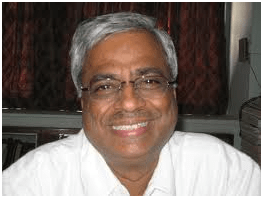 by Karthik Thiagarajan
by Karthik Thiagarajan
Professor Ashok Jhunjhunwala has been in our institute since 1981 and leads the TeNet group (Telecommunication and Computer networking group). Prof. Jhunjhunwala is an alumnus of IIT Kanpur. Among his many achievements, the Padma Shri award in 2002 for his distinguished service in science and engineering is the most notable one.
In a lecture organized by the NSS team on the 2nd of October, he talked about the influence of incubated companies in rural areas.
The question he addressed in his lecture was: “Can incubated companies make a difference in rural areas?” The lecture began with accounts of interesting incidents in the his life. He narrated that in the 1980s, he had to wait for eight years to get a telephone and four years to get a Bajaj scooter. When he enquired the authorities about the gas cylinder, he got a reply which stated that he would probably not get it in his lifetime. “India was struggling in the 80s and these incidents mirror the difficult situation that prevailed in that era. Importing a single microprocessor took IIT as long as one year in those times.”
The situation in rural India has certainly improved for the better, but there is still a lot of scope for improvement, he feels. He highlighted the impact that the National Rural Employment Guarantee Scheme (NREGS) has had in villages. NREGS guarantees minimum wages of hundred rupees for at least one person in every household. This scheme has given people a sense of financial security. At this point the professor introduced RTBI- Rural Technologies and Business Incubators. He discussed some of the successful companies pertaining to fields as diverse as manufacturing, health-care and education. He mentioned that imported products that are affordable in a foreign country may not be so in India. He emphasized the need to use technologies to reduce costs. The Telecommunication and Computer networking group (TENET- IITM) was started with this objective. Fortunately, India got moving in the early nineties. The average income of households in urban India gradually increased over the years. The professor displayed relevant statistics that indicated the development that has taken place in urban cities. He also stressed the importance of economic growth and the role played by engineers in sustaining it.
Manufacturing – Prof. Jhunjhunwala feels that outsourcing manufacturing to villages will lead to the improvement of rural areas by providing jobs to a number of people. This would prevent migration of people from villages to cities in search of jobs. Some of the companies in this sector are ROPPE and VASTRA. DesiCrew Solutions is a company incubated by RTBI which is basically a rural BPO. MobilTrain is another company which uses SMS to improve the skills of teachers. The professor hinted about a possibility of students of IITM developing applications for the Aakash tablet. Avaz is another interesting company that assists differently abled people in communicating.
Health care – Technology has advanced to such a level that ECG, heartbeat rates and a number of other facilities have been installed in villages. This data is given to a doctor and video conferencing facilitates in communicating the results of the diagnosis to the patient. Ayzh is a company that produces birth delivery kits.
Agriculture – Professor Jhunjhunwala listed down the important problems faced by the farmers in villages are crop disease, rainfall uncertainty, and market risk. Call centres for farmers have been established to help them with these problems. Complete information about every farmer is contained in their databases. If a farmer calls up and states his problem, the call centres will respond with a solution after going through his details. If the solution was not feasible, alternate solutions would be provided.
Prof. Jhunjhunwala thus explained that technology should act as a bridge between villages and cities in order to reduce the rural-urban divide. As a concluding remark, he emphasized the need for balancing economic growth with social development and that technology has the potential to achieve this.


